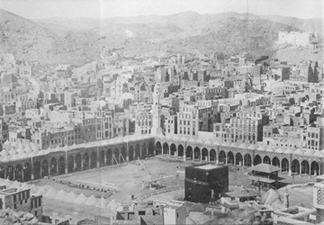[Note: Arthur John Byng Wavell (1882-1916) was a British soldier and adventurer who traveled in disguise to Mecca in 1908 and went on to Yemen in 1911 to witness fighting between the Zaydi imam’s troops and the Ottoman Turks. This account was originally published in 1912.]
Among all the pilgrims of different races daily pouring in [to Mecca on the hajj], I was most struck by the Javanese. In appearance and manners they seem not unlike the Japanese. They have the same acquisitive and imitative temperament, are intensely curious regarding everything new to them, and quick to adopt any fresh idea that may seem to them an improvement on what has gone before. In this they stand in strong contrast to the Arabs, and in fact to most Eastern peoples, whose extreme conservatism is what really hinders their progress. But while the Japanese have seemingly agreed to take England as their model, the Javanese endeavor to turn themselves into Arabs. The first thing they do on arriving is to attire themselves in the local costume – which, by the way, does not suit them at all. I am told that there are so many people wearing Arab dress in Java that a stranger might fancy himself in the Hedjaz. Most of them seem very well-to-do-, and they spend more money in Mecca than any other class of pilgrims. They often pay 100 [British pounds] for the use of a house at Mina for the three days of the pilgrimage. They are very keen Mohammedans, excellent linguists, and far better informed regarding current affairs than either Arabs or Turks. A certain Abd-ur-Rahman, with whom we later became acquainted, once made some remarks concerning them that struck me as worth remembering “It is in these people,” he said, “and not in the Turks, that our hope for the future lies. They possess all the qualities we Arabs lack and will take from the Europeans their inventions and use them against our enemies just as Japan did with Russia.
I know no more about that part of the East than he does, but it is certainly a fact that in China, Java, and the Malayan Archipelago there are now some millions of Mohammedans, and the faith is rapidly spreading. It therefore seems by no means unlikely that he may be right in supposing that these new Far Eastern branches may prove a source of strength to Islam in the near future. In spite of the newspapers, Europe remains curiously ignorant in some ways. Our fathers regarded the Japanese in very much the same way as to-day we regard the Zulus. Possibly the next generation will have to reproach our own lack of forethought in similar instance. Many people display a curious self-complacency in speaking of “governing” and “subject” races. They may be quite right in supposing that the power and civilization of the world will remain for all time centered among the nations of Western Europe, but there is nothing to prove it. Inductive reasoning, based on what we know of the world’s history, leads to a contrary conclusion. Their theory, in fact, like that responsible for “race prejudice,” rests on a gratuitous assumption.
[Excerpt from A Modern Pilgrim in Mecca and a Siege in Sanaa, by Arthur John Byng Wavell. Reading: Garnet Publishing, 2005[1912], pp. 139-140.]
